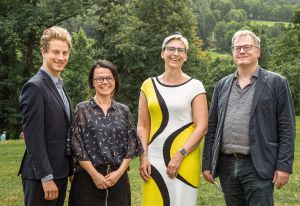A Report on the 2019 isaScience Conference
What does the end of the silent movie era have to do with unemployment among orchestral musicians? What parallels can we draw between this historical example from the 1930s and the digitisation of musical labour or the employment of new technologies? Are human musicians soon to be supplanted by virtual stars with neither physical needs nor feelings and with round-the-clock availability?
These and other questions were discussed by more than 30 researchers from 13 countries at the 7th isaScience Conference, which was held from 7 to 11 August 2019 in Reichenau an der Rax. Interdisciplinarity, one of the most important characteristics of isaScience, was omnipresent—both in the accordingly composed panels and in the two podium discussions, in which all of the conference participants engaged with great vigour. The fields of music history, music sociology, cultural institutions studies, and ethnomusicology entered into a highly productive dialogue in keeping with the overarching themes of “Music as Labour”, “Power Struggles & Political Activism”, and “Emotional & Affective Musical Labour”. The active discussions revolved around the oft-precarious working conditions of musicians as well as around the mechanisms of contemporary and historical music production along with their underlying conditions. The central focus here was on contributions to the #MeToo debate, on various forms of discrimination based on class, race and gender, and on ways of offering music students and music professionals social, political, and psychological reinforcement.
Participants from the mdw contributed topics including music outreach as a new challenge for the traditional music business, the sociological analysis of classically trained musicians’ careers, and the Puerto Rican “plena” genre’s political dimensions. And the mdw’s exil.arte Center made its own contribution to isaScience with a screening and discussion of the documentary Das erste Jahrhundert des Walter Arlen (on the story and oeuvre of exiled composer Walter Arlen) at the open-air cinema in the palace garden at Schloss Wartholz.
Four outstanding keynote lectures served to introduce the respective days’ themes: Sally-Anne Gross (UK) spoke on the women’s movement and the music industry; she also enthusiastically contributed her experience-based examples to the discussions during the following days. Gross’s position between university teaching and music production on the “free” market can be viewed as pioneering with regard to future reorientations of music education and university curricula.
The keynote lecture by William Cheng (USA) inquired as to affective identifications in music consumption: how do we feel when we love music by an individual who turns out to have spent years engaging in sexual abuse or other abuses of power? Can (and should) we still watch clips by Michael Jackson today or listen to recordings of performances conducted by James Levine?
Rumya S. Putcha (USA), in her keynote lecture on the third day, dealt with the Indian dance industry in the US and its connections to Hindu nationalist appropriations of dance forms that originated within oppressed castes. In the process, she addressed structural violence in the form of anti-feminist, racist, and sexual abuse, thereby according great importance to countering the conditioning associated with whiteness and woman-ness.
The keynote lecture on the conference’s final day was given by William Weber (USA). In his talk, he took listeners on a quest that led to the Music Halls in London and the café concerts in Paris, which he identified as starting points of a developing “popular music”: during the 19th century, people could afford to attend concerts of contemporary music not least because the participating musicians began relying more on music associations and unions rather than on engagements at Europe’s “great venues”.
isaScience once again showed itself to be a project that is not only interdisciplinary but also international: alongside two isaScience grant recipients from Belgrade, a great many of those who gave talks came from countries located east of Austria—alongside presenters from the USA, Great Britain, and other European countries, not to mention Austria itself. This confirms the apparently global presence and urgency of “music as labour” as a topic.
The researchers who comprise the leading team of isaScience—Dagmar Abfalter, Marko Kölbl, Rosa Reitsamer, and Fritz Trümpi—have already announced a working title for the theme of isaScience 2020: Heroes, Canons, Cults. Postcolonial and Queer-Feminist Perspectives. A theme that, not insignificantly, can (also) be understood in the context of Ludwig van Beethoven’s 250th birthday.

isaScience 2020
12—16 August 2020
Hotel Marienhof
Hauptstraße 71–73
2651 Reichenau an der Rax
mdw.ac.at/isa/isascience
